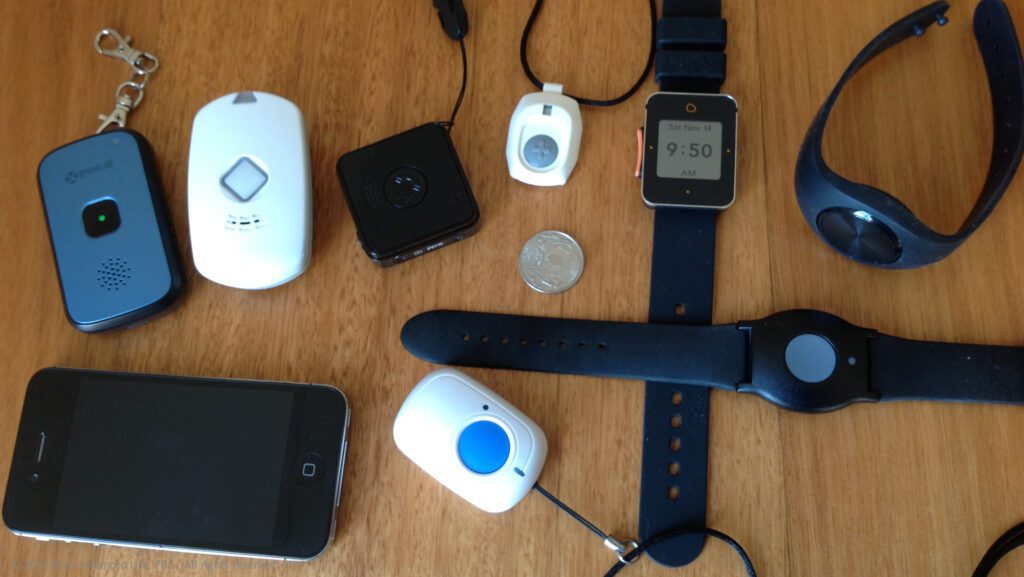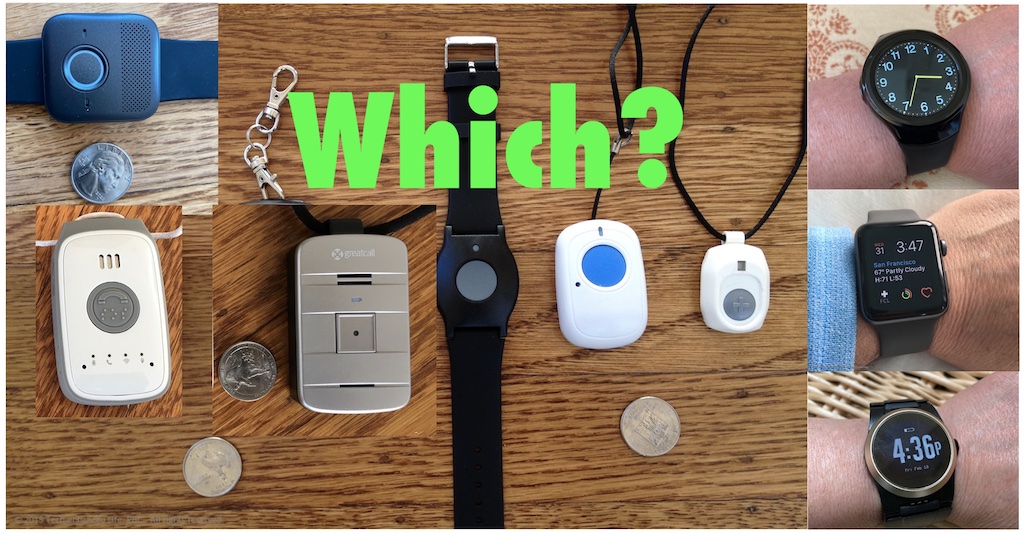
Welcome to the Tech-enhanced Life guide to medical alert systems & services for older adults. (These products are also known as personal emergency response systems, or PERS.)
This guide is designed to help you answer the question: “Which medical alert system is right for me?”
If you are looking for independent, objective evaluations of medical alert systems — that include actual hands-on testing — you have come to the right place.
Where to Start?
New to the Topic?
If you are new to the topic of medical alerts, start with the “Learning Module: About Medical Alert Systems“. It includes video of a talk about the topic, as well as a written “tutorial”, and explains what medical alerts are for, and what the different types of medical alert are.
Want to Understand How to Decide What Matches your Life Situation?
If you already know the basics and want to understand how to approach matching your life situation with the best type of medical alert for you, you can either browse the individual reviews and “Best of” articles starting on the “Review Page”. OR, you can start on the “Just Tell Me What to Buy” section, where we discuss different types of personas, and what is typically best for each of those personas.
Just want the Latest Updates and New Product Overviews?
We cover “what’s new” in the field of medical alerts in an annual Update that we publish in our Newsletter. You will still want to understand the basics as above, but for the “latest”, see below.
- Medical Alert Update: 2024. (In the Tech-enhanced Life Newsletter run by the Longevity Explorers).
Want to Know More About Our Research on Medical Alerts?
We have been covering this topic since 2015. Read on for an overview of what we have learned, how we approach reviewing specific products, and how the frontier of innovation has changed over the time we have been covering the field.
Contents
- About Medical Alerts
- About Our Research & Medical Alert Reviews
- How to Select the Right Medical Alert for YOU
- Learn More & Find the Right Product
About Medical Alerts
A Medical Alert System is an electronic “gadget” that includes some type of button you press, or an automatic sensor that detects you have a problem. When you press the button or the problem is identified, the system somehow sends a message to a “responder” and then that responder takes some action — if necessary summoning help in the form of the emergency services (eg 911).
Medical Alert Systems are conceptually simple. You press a button and help comes.
But when it comes down to choosing one, it turns out there are quite a few subtleties that one needs to take into account to be sure of choosing the best medical alert for a given person.
To get an introduction to the different types of medical alerts, and how to think about what is most important for your specific life situation, learn more using the two pieces of content below:
- A “tutorial” explaing what medical alert systems do, and the key features; and
- A video lecture by Dr. Caro explaining what medical alerts do; which features matter most; and how to approach selecting the right one for you.
Access both of these pieces of content in our Learning Module: About Medical Alert Systems
About Our Research & Medical Alert Reviews
In our research we have found that while there is no one “best medical alert system” for everyone, there are often a handful of systems which are best suited to any given individual.
So, the emphasis of our work is NOT “what is the best medical alert?”. Instead, we focus on “What is the Best Medical Alert for YOU?“
Why Comparative Evaluation is Key
The Internet is chock full of material about medical alert systems, as it is a fairly large market with a lot of small companies all competing to sell you their products.
We think it is essential to perform actual, hands-on testing of these products if one wants to make specific recommendations.
But we think you need to go further than that. For each “category” of medical alert system, we decided what is needed is a sort of comparative evaluation of the most promising products in that category. This way we end up being able to recommend both the best medical alert system in a specific category, as well as the best medical alert system for a specific person.
When we do a deep dive into one of the subcategories of medical alert — what we call a “best of breed” analysis — we include the following steps:
- generating a list of the most promising products in the category (“breed”) using various types of desk research;
- acquiring all the most promising products in the category;
- designing a simple research protocol to let us do a comparative evaluation that tests the more important features of the products;
- carrying out actual hands-on testing of the individual products, each with the same protocol, and capturing the results;
- synthesizing what we learned and condensing it into a simple “best medical alert system” report for each category.
Our Medical Alert Research Over the Years
We started evaluating medical alert systems back in 2015, when members of the Tech-enhanced Life community told us they were having great difficulty making sense of the competing marketing claims, and that there seemed to be no objective source of information on the Internet about these products.
In our initial evaluations we acquired, and did in-depth, hands-on evaluation of over 50 medical alert products, and then published our research in the form of a “Selection Guide” and accompanying “Selection Tool” — so others could benefit from our work.

Caption: Some of the original medical alerts we evaluated.
Since 2015 we have updated this research multiple times, and expanded it as new products emerged.
The people who do the actual evaluations are technologists rather than journalists, and are themselves either older adults or the children of aging parents.
And for our initial research project, we recruited a panel of expert advisors to guide our questions, including clinicians and aging services professionals with extensive experience in working with the older adult population that uses these medical alert systems. Professional competencies in the advisor panel included social work, physio-therapy, and nursing, and experience operating independent living communities.
Independent, Objective
We strive to produce independent and objective research — with a focus on helping older adults and their families.
Thus, our research is NOT funded by any of the vendors. Nor do we accept sponsored content or allow the medical alert manufacturers or distributors to influence what we write. For our initial research project we acquired all the products at our own expense, without the vendors being aware we were conducting the study. As we subsequently updated our research, we sometimes ask the vendors to loan us the equipment.
We do sometimes use affiliate links, which means that if you purchase products that you learn about on this website, we sometimes receive compensation as a result of being a member of an affiliate program. See How we Fund our Research.
The Frontier of Innovation Shifts Over Time
When we first started working on this topic (in 2015), people’s image of medical alerts was set by advertisements with the theme of “I’ve fallen and I can’t get up”.
These showed a very frail old lady and emphasized frailty and dependence and avoidance of harm.
In 2015, the frontier of innovation was a new category of medical alerts, called mobile medical alerts, that enabled people to have a medical alert that could “go anywhere” — where previously these products only worked “at home”.
Our initial coverage focused on the pluses and minuses of a mobile medical alert vs an at home medical alert. And on important differences between different products in the mobile medical alert category. If you are interested in this older coverage, you can find it in the archive.
Then, in 2018 we first evaluated an Apple Watch with Fall detection as a potential alternative to a conventional medical alert.
In the years since then, a number of vendors have introduced new “smartwatch as medical alert” products, and the focus of innovation in the field has moved to this category.
At the same time, the technology inside the mobile medical alerts has improved, and the vendors offering mobile medical alerts have converged on very similar sets of features.
As we write this in late 2023, we think the way to think about the medical alert field is as follows.
- At-home medical alerts are mostly rather similar. The products are made by a handful of OEM vendors and then resold by medical alert vendors under various names. It is probably most important to focus on the reputation of the individual vendors for service and for the responsiveness of their call centers (responders) rather than the detailed features of the individual products.
- Mobile medical alerts have matured too, and much of what we say above in the section on at-home medical alerts now also applies to mobile medical alerts. However, there is still some progress in making mobile medical alerts smaller and lighter, and so it is good to look at these characteristics when choosing.
- Smartwatch medical alerts are now where the interesting new developments are happening. So much of our coverage from 2023 on focuses on this category.
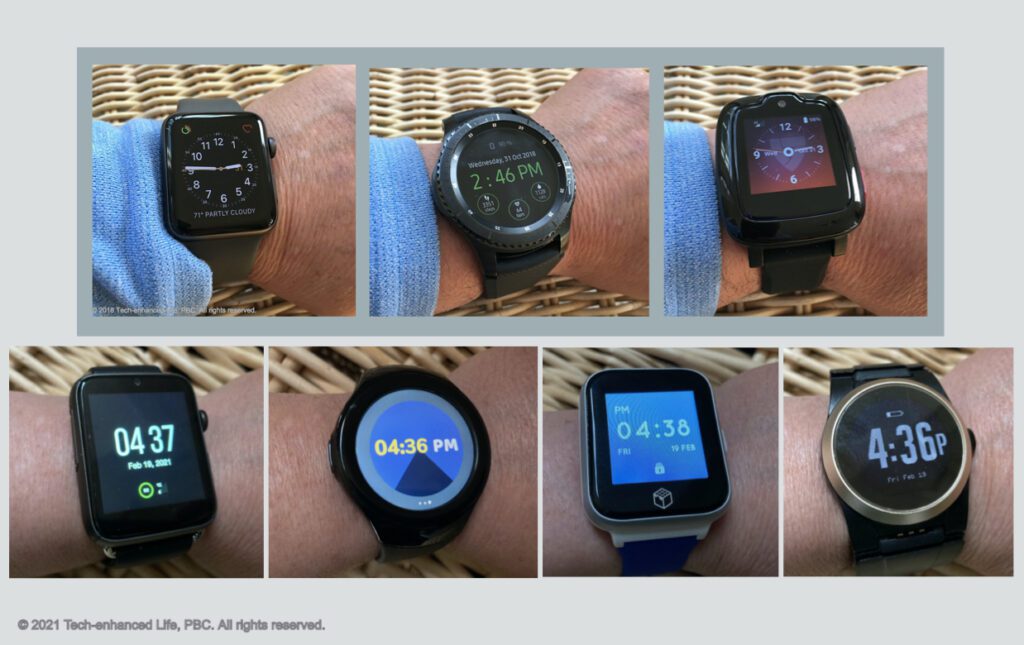
Caption: Some of the smartwatch medical alerts we have evaluated.
How to Select the Right Medical Alert for YOU
In our research we have found that while there is no one “best medical alert system” for everyone, there are often a handful of systems which are best suited to any given individual.
But which flavor of system matches your needs, and which exact products have those characteristics? And of those, which is “best of breed”?
In this work we have tried to create an independent and objective guide that helps you:
- understand what types of medical alert systems exist;
- decide which flavor will be right for a specific individual;
- sort through the marketing chaff to generate a short list of products that have the right feature set for your needs; and
- pick the “best of breed” based on independent and objective analysis and testing, supported by clearly explained data.
In the past we had a detailed set of tools to pick specific products, but we have phased that out due to the costs of maintaining it, as well as to the fact that we no longer think such breadth is needed, except in the smartwatch category.
We have found our readers approach this in two different ways, depending on their personality.
One type of person wants to be able to read lots of reviews and then decide for themself. The other type of person says “Just tell me what to buy!”
I want to read lots of reviews
For the people who want to read the reviews, and make their own decisions, after thinking about what features matter to them, we recommend the detailed coverage in the section below, and the Best of Breed analyses further down the page.
Specific Best of Breed Comparisons
Here are some of the most popular “best of breed” analyses.
- Medical Alert Watches and Fall Detection Watches
- Mobile Alert Systems (Note: this is somewhat outdated but the methodology and questions we asked are relevant)
Just tell me what to buy!
For people with this point of view, we developed an approach based on “Personas”. You just need to figure out which of several “personas” is the one that best fits you, or the person who needs a medical alert, and then we have some more specific recommendations.
“I don’t want to become an expert on this stuff. Just tell me what to buy!“
Personas
The bad news is that different types of people really should buy different types of medical alert systems. So there is not “one best medical alert for most people”.
The good news is that its pretty easy to group people into some broad “categories” — which we call personas. And for a given persona there are indeed some specific products we recommend.
We created several distinct “personas”, as follow:
- “Go-Go” Persona;
- “Slow Go” Persona;
- “No Go” Persona;
- “Needs Some Care” Persona;
- “24/7 Care at Home” Persona.
Specific Medical Alert Recommendations for Each Persona
Follow the link below to see detailed descriptions of the personas, and then specific product recommendations for each different persona.
- Just Tell Me Which Medical Alert to Buy! Choose a Persona that matches your situation. Get specific product recommendations.
Learn More & Find the Right Product
Here is the approach we recommend.
- Step 1: Review the tutorial and lecture on medical alerts here.
- Step 2: Decide which category of medical alert best suits your lifestyle, either from the above material or using the Personas.
- Step 3: Learn more with the relevant Best of Breed articles below.
- Step 4: Read individual reviews in the review area.
- Step 5 (if you want perspective): browse the archives to understand the types of questions we ask when we review the products.
Stay Up to Date as we Improve our Research on Medical Alerts
To stay up to date as we update our research, subscribe to our Newsletter
Featured Research
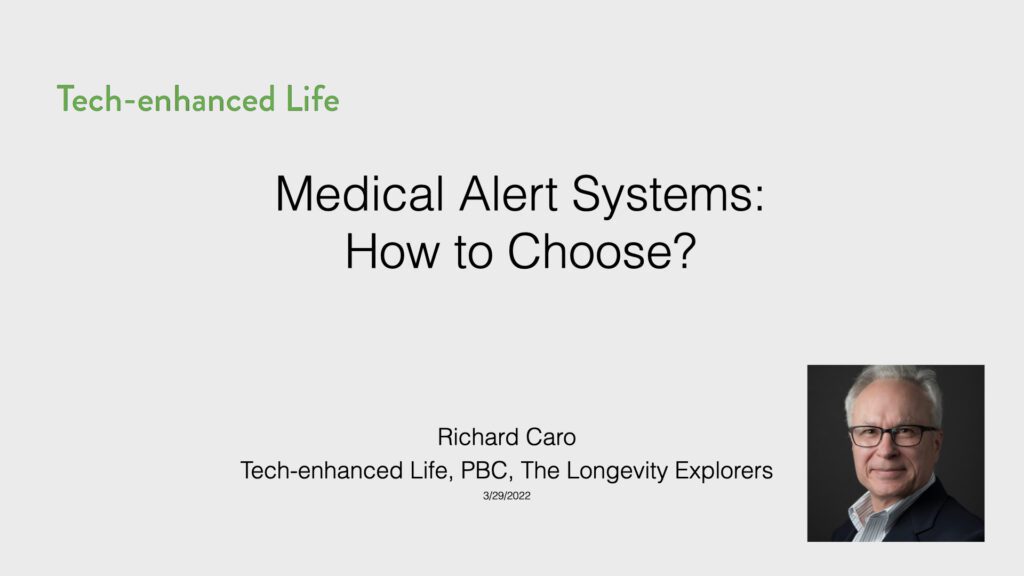
Seminar 3: Which Medical Alert? And Who Needs One?
Medical Alerts are well known “safety” devices. However there are many different types, and there are very few resources to help decide which type is best. Tech-enhanced Life has for years been evaluating different products in this category. While we do not believe there is such a thing as a “best” medical alert, we do think there are often a handful of “best” products for specific individuals (the right features depend on lifestyle).
In this talk, we will explain how to decide which type of medical alert is right for a specific person, and introduce you to the detailed coverage on Tech-enhanced Life that will enable you to pick a specific product that works for the person in question.
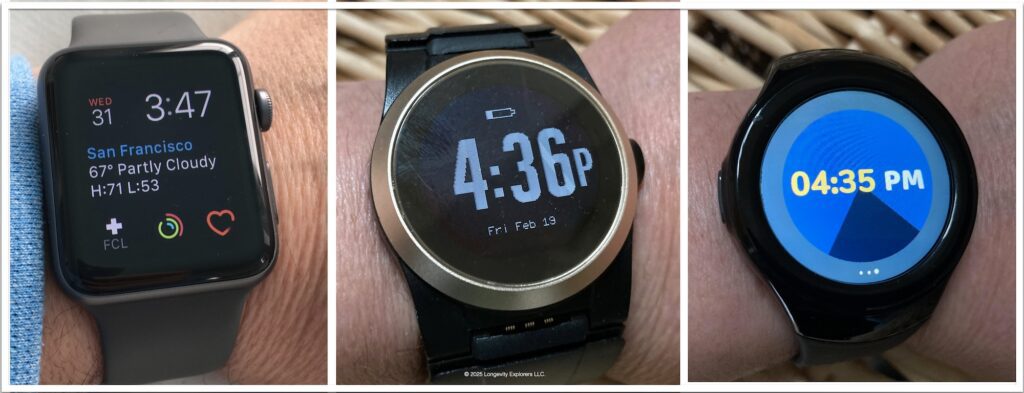
Best Fall Detection Watch: Hands-on Evaluation
Which is the best fall detection watch, many older adults and their families are wondering? We look at how to choose the best fall alert watch for a given individual. The evaluations described here include actual hands-on testing, done by technologists who also happen to be older adults.

Smartwatch as Medical Alert?
For years we have been hearing older adults complain about how ugly and stigmatizing medical alerts are. As one lady told us: “My medical alert button makes me look like I escaped from the Intensive Care Unit. So I hardly ever wear it“.
A handful of medical alert watches have come to market that look like smart watches, and have some or all of the functionality of stylish smartwatches, but also work as medical alerts. We wanted to see how well they worked, and set out to test them — hoping they might change this dynamic. Here are the results, updated for 2021.
Additional Research in this Topic Hub
Individual Sections of this Guide
Learning module | Medical Alert System Reviews | Just Tell Me What to Buy
Feedback & Testimonials
Here is some of the feedback we have received so far about our research into medical alert systems and the selection tools we have developed.
“I really enjoyed your presentation last night. It was a very complex topic and you broke it down really well. I know you must have put a ton of work into it.” Phil Marechal, Home Instead Franchise Owner.
I happened to look on my Nextdoor site and read that a neighbor was looking to help simplify the search for a medical alert device. I sent her a link to your page. Below is her response:
“Thank you so much Lisa, that’s an awesome site and already is helping me narrow down the overwhelming choices. My husband and I have attended a couple Aging2.0 events, and while it’s great to see the technology ideas being put out there, it also becomes another burden on the caregivers to make to ‘right’ choice. This really helps…thanks again.” Lisa Brinkmann, Executive Director, Marin Villages.
“The Medical Alert System Guide is a really wonderful resource, thank you for making it available!” Scott McMullin, Co-Chair of Sequoia Village.
“I enjoyed your workshop and I found it very useful to get the user’s point of view. Since I work at a nonprofit with people with disabilities in San Mateo County, safety is a big concern. Clients want to be safe and independent as possible. I found two things especially helpful with the workshop: 1) identifying the user types in detail and prioritizing needs, and 2) matching those needs with the latest industry tools.” Leonardo Camargo, Assistive Technology Coordinator, Center for Independence of Individuals with Disabilities, San Mateo, CA.
“Your workshop was very informative, very helpful! With so many products on the market, it is difficult to know which personal emergency response system is the best one. Your systematic way of aligning the needs and life-style of prospective purchasers is both practical and thorough.”, PH, Workshop attendee, Missoula, Montana.
“Yes! Keep doing these workshops!!!! It was extremely helpful. I only wish I’d had access to your information a year ago, when I first purchased an emergency response system for my Dad. Now that he is no longer driving, a different system is in order. So, I very much appreciated your information.” SB, Workshop attendee, Missoula, Montana.
“Thank you again. It is a beautiful site! I used the decision tree and it appears the Splash from GreatCall would be the ideal choice as I want her to have wearable device that can go with her wherever there is cell coverage. My only remaining worry is that because she is hard of hearing she may not interact successfully when they attempt to contact her when she falls. I am hoping it would prompt them to call me as an emergency contact.” EB, User of Online Selection Tool.
